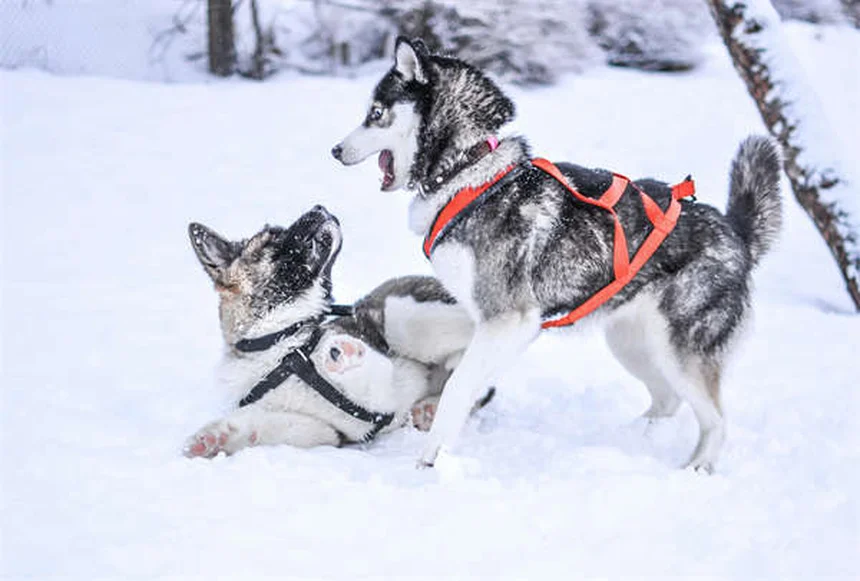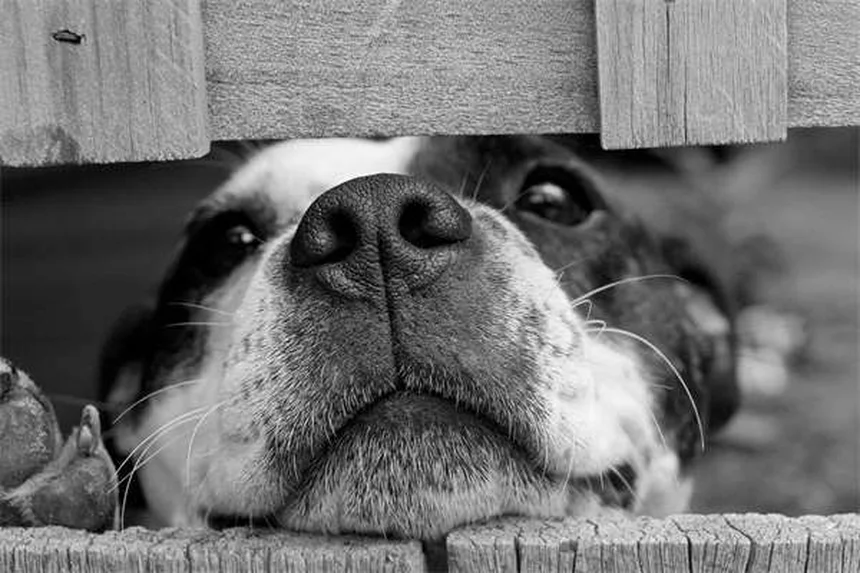Dog Pollen Allergies: Symptoms, Treatment & Prevention Tips
What exactly are pollen allergies in dogs? The answer is: they're one of the most common seasonal allergies affecting our furry friends! Just like humans, dogs can develop allergic reactions to those tiny pollen particles floating in the air. When your dog inhales or comes into contact with pollen, their immune system goes into overdrive, treating these harmless particles like dangerous invaders.I've seen countless dogs in my practice suffering from pollen allergies, and let me tell you - the itching and discomfort can be miserable. The good news? With proper understanding and care, we can help our pups feel better. In this guide, we'll walk through everything you need to know - from spotting the first signs to effective treatments that really work.You'll discover why some breeds are more prone to allergies, how vets diagnose the problem, and most importantly - practical solutions you can start using today. Whether it's medication options, home management tips, or prevention strategies, we've got you covered. Let's help your dog breathe easier and scratch less!
E.g. :6 Clear Signs Your Dog Trusts You (And How to Build More Trust)
- 1、What Exactly Are Pollen Allergies in Dogs?
- 2、Spotting the Signs: Symptoms of Pollen Allergies
- 3、Why Some Dogs Suffer More: Causes and Risk Factors
- 4、Getting the Right Diagnosis
- 5、Effective Treatment Options
- 6、Daily Management Tips
- 7、Living With Allergies Long-Term
- 8、Beyond the Basics: Lesser-Known Allergy Facts
- 9、Alternative Approaches Worth Considering
- 10、Understanding the Emotional Impact
- 11、Innovations in Allergy Treatment
- 12、When to Consider a Specialist
- 13、Prevention Strategies for Puppies
- 14、FAQs
What Exactly Are Pollen Allergies in Dogs?
The Tiny Troublemakers
You know those sneaky little particles floating around in spring air? Pollen might be invisible to our eyes, but for some dogs, they're like tiny ninjas attacking their immune systems. These microscopic particles come from flowers, trees, and grasses, hitching rides on wind, insects, and even your dog's fur!
Here's something interesting - did you know pollen types change with seasons and locations? Spring brings tree pollen, summer means grass pollen, while fall introduces weed pollen. Your dog might react differently depending on what's blooming in your area. This seasonal variation explains why some dogs only show symptoms during certain months.
Why Do Some Dogs React?
Imagine your dog's immune system as an overeager security guard. For most dogs, pollen is harmless - like a friendly visitor. But for allergic dogs, their immune system sounds the alarm bells, treating pollen like dangerous intruders. This overreaction causes all those uncomfortable symptoms we'll discuss next.
Now you might wonder - "Why does this happen to some dogs and not others?" Great question! While we don't have all the answers, genetics play a big role. Some breeds are more likely to develop these allergies, which we'll cover in detail later.
Spotting the Signs: Symptoms of Pollen Allergies
 Photos provided by pixabay
Photos provided by pixabay
The Itchy and Scratchy Show
If your dog could talk, they'd probably say "I can't stop scratching!" Here are the most common signs of pollen allergies:
| Symptom | How It Looks | Common Areas Affected |
|---|---|---|
| Itchy skin | Constant scratching, rubbing against furniture | Belly, paws, ears |
| Paw licking | Excessive licking, sometimes until raw | Between toes, paw pads |
| Watery eyes | Teary discharge, redness | Around eyes |
| Sneezing | Frequent sneezing fits | Nose area |
Pro tip: If you notice your dog doing the "butt scoot" across your carpet, it might not just be anal glands - allergies can cause intense itching back there too!
Less Obvious Symptoms
Some signs aren't as obvious but equally important. Your dog might develop:
- Recurrent ear infections (that yeasty smell means trouble)
- Patchy hair loss from constant scratching
- Red, inflamed skin that feels warm to touch
- Changes in stool consistency
Here's something surprising - some dogs show digestive symptoms like loose stools when they ingest pollen while grooming. Who knew allergies could affect the gut too?
Why Some Dogs Suffer More: Causes and Risk Factors
The Genetic Lottery
Ever noticed how some breeds seem to have all the allergy problems? Here are the usual suspects:
Top Allergy-Prone Breeds:
- Bulldogs (both English and French varieties)
- Golden and Labrador Retrievers
- German Shepherds
- Boxers
- West Highland White Terriers
But wait - "Does this mean my mutt is safe?" Not necessarily! While purebreds have higher risks, any dog can develop pollen allergies. Even your tough-looking Pit Bull might be secretly sensitive to those spring blooms.
 Photos provided by pixabay
Photos provided by pixabay
The Itchy and Scratchy Show
Where you live makes a huge difference. The worst pollen offenders in the U.S. include:
Pollen Hotspots:
- The Midwest (Kansas, Iowa, Missouri)
- Southern states (Texas, Oklahoma)
- Parts of the East Coast (South Carolina, Pennsylvania)
Meanwhile, dogs in the Rocky Mountain region (Colorado, Utah) tend to catch a break with lower pollen counts. If you've moved states and noticed changes in your dog's allergies, you're not imagining things - different plants mean different pollen triggers!
Getting the Right Diagnosis
The Vet Detective Work
Diagnosing pollen allergies isn't as simple as a single test. Your vet will play detective, considering:
- Your dog's medical history
- Seasonal patterns of symptoms
- Physical examination findings
- Response to initial treatments
They'll likely rule out other causes first - maybe it's fleas, food allergies, or even mites causing those symptoms. This process can feel frustrating, but hang in there!
Advanced Allergy Testing
For precise identification, vets might recommend:
Intradermal Testing: The gold standard where small amounts of allergens are injected under shaved skin to check reactions. It's like a "pollen lineup" to identify the exact culprits.
Blood Tests: While less accurate than skin tests, these can help identify antibodies to specific pollens. Think of it as a less invasive alternative when skin testing isn't possible.
Effective Treatment Options
 Photos provided by pixabay
Photos provided by pixabay
The Itchy and Scratchy Show
Depending on severity, your vet might recommend:
- Antihistamines: Like Benadryl or Zyrtec (but never give human meds without vet approval!)
- Prescription Drugs: Apoquel or Cytopoint for more severe cases
- Steroids: For short-term relief during bad flare-ups
Remember that new medication Zenrelia? It's making waves for atopic dermatitis with just one daily pill - ask your vet if it might help your pup!
Beyond Medications
Sometimes the best approach combines multiple strategies:
Allergy Shots: Custom-made injections that gradually desensitize your dog to specific pollens. It's like training their immune system to stop overreacting.
Supplements: Omega-3 fatty acids (found in fish oil) can strengthen skin barriers. Products like Welactin or EicosaDerm make supplementation easy.
Topical Therapies: Medicated shampoos (like Douxo S3) can soothe irritated skin and prevent secondary infections from all that scratching.
Daily Management Tips
Reducing Pollen Exposure
You can't eliminate pollen completely, but these tricks help:
- Wipe paws after outdoor adventures
- Bathe every 2-4 weeks with gentle shampoos
- Use HEPA air filters indoors
- Wash bedding frequently
Pro tip: Schedule walks when pollen counts are lower - usually late afternoon after morning pollen releases.
When Prevention Isn't Enough
For severe cases, your vet might recommend starting medications before allergy season hits. It's like putting up defenses before the pollen army attacks!
And don't forget flea/tick prevention - many allergic dogs are sensitive to these pests too, making their pollen reactions even worse.
Living With Allergies Long-Term
Managing Expectations
Here's the honest truth - we can't cure pollen allergies, but we can make them manageable. With the right approach, most dogs live comfortable, happy lives despite their sensitivities.
Keep a symptom diary noting when flare-ups occur. This helps identify patterns and adjust treatments before problems escalate.
When to Seek Help
Don't wait until your dog's skin is raw to see the vet. Early intervention prevents secondary infections and unnecessary suffering.
Remember - you're not alone in this! Millions of dog owners navigate pollen allergies successfully every year. With patience and the right veterinary partnership, your pup can enjoy every season comfortably.
Beyond the Basics: Lesser-Known Allergy Facts
The Surprising Connection Between Gut Health and Allergies
Did you know your dog's tummy troubles might be making their pollen allergies worse? Recent studies show that gut health plays a huge role in how the immune system responds to allergens. When the balance of good and bad bacteria gets out of whack, it can trigger stronger allergic reactions.
Here's something fascinating - probiotics specifically designed for dogs might help reduce allergy symptoms. Products like Purina FortiFlora or VetriScience Probiotic contain strains that support immune function. Think of them as tiny peacekeepers negotiating between your dog's immune system and those pesky pollen particles!
Climate Change's Impact on Dog Allergies
You've probably noticed allergy seasons getting longer and more intense - and it's not your imagination! Warmer temperatures mean plants produce pollen earlier and for more extended periods. Some areas now have pollen seasons that start weeks earlier than they did just 20 years ago.
This table shows how pollen seasons have changed in different regions:
| Region | Pollen Season Start (1990s) | Pollen Season Start (2020s) | Change |
|---|---|---|---|
| Northeast | Early April | Mid-March | +3 weeks |
| Midwest | Late March | Early March | +4 weeks |
| South | February | January | +4 weeks |
| West Coast | Mid-March | Late February | +2 weeks |
This extended exposure means our dogs' immune systems get less time to recover between seasons, potentially making reactions worse over time.
Alternative Approaches Worth Considering
Can Acupuncture Help Allergic Dogs?
You might chuckle at the thought of your dog covered in tiny needles, but veterinary acupuncture has shown promise for allergy relief. Certified veterinary acupuncturists use hair-thin needles to stimulate specific points that may help regulate the immune response.
While it won't replace traditional treatments, many pet owners report noticeable improvements when combining acupuncture with their vet's recommended plan. The best part? Most dogs actually relax during sessions - some even fall asleep!
The Power of Local Honey - Myth or Reality?
You've probably heard the old wives' tale about local honey helping with allergies. But does this apply to dogs? The theory suggests that small amounts of local honey containing trace pollens might help desensitize the immune system.
Here's the scoop - while the science isn't conclusive, many holistic vets agree that a teaspoon of raw, local honey daily might offer some benefits. Just remember: never give honey to puppies under one year, and always check with your vet first, especially if your dog has diabetes.
Understanding the Emotional Impact
How Allergies Affect Your Dog's Mood
Ever been so itchy you couldn't think straight? That's how your dog feels during allergy flare-ups. Chronic discomfort can lead to:
- Increased irritability
- Decreased interest in play
- Changes in sleep patterns
- Reluctance to be touched
This brings up an important question - "Is my grumpy dog actually suffering from allergies?" Absolutely! When dogs don't feel well, they can't tell us directly, so they show it through behavior changes. If your normally cheerful pup seems "off," allergies might be the hidden culprit.
The Owner's Emotional Toll
Let's be real - watching your dog suffer is heartbreaking. Many pet parents experience:
Guilt: "Did I do something to cause this?" (Spoiler: you didn't!)
Frustration: When treatments don't work immediately or perfectly
Financial Stress: Allergy management can get expensive
The good news? Support groups (both online and local) can connect you with others facing similar challenges. Remember - you're doing your best, and that's exactly what your dog needs.
Innovations in Allergy Treatment
Breakthroughs in Immunotherapy
The future looks bright for allergy sufferers! Researchers are developing:
Oral Immunotherapy: Instead of shots, these are dissolvable tablets that work similarly but are much easier to administer. Imagine just popping a treat-like tablet instead of giving injections!
Monoclonal Antibody Therapy: New drugs like Cytopoint represent a major advancement - they specifically target the itch pathway without suppressing the entire immune system. Many dogs show improvement within 24-48 hours.
High-Tech Home Solutions
Your smartphone can now help manage your dog's allergies:
Pollen Tracking Apps: Apps like Pollen.com provide real-time pollen counts so you can plan outdoor activities when levels are lowest.
Smart Air Purifiers: Devices like Dyson Pure Cool automatically adjust filtration based on air quality readings, removing allergens before they bother your pup.
Wearable Monitors: Some new dog activity trackers can detect excessive scratching or licking, alerting you to potential flare-ups before they become severe.
When to Consider a Specialist
Signs You Might Need a Veterinary Dermatologist
Your regular vet is fantastic, but sometimes you need extra expertise. Consider a specialist if:
- Your dog isn't responding to standard treatments
- Allergy symptoms persist year-round
- Skin infections keep recurring
- Quality of life is significantly impacted
Dermatologists have advanced training and access to cutting-edge treatments that general vets might not offer. They're like the allergy detectives who can crack tough cases!
What to Expect at a Specialist Visit
Wondering how these appointments differ? Typically, you'll experience:
More Detailed Testing: They might do advanced skin or blood tests to pinpoint exact triggers
Customized Treatment Plans: Tailored specifically to your dog's unique needs
Follow-Up Care: Often more frequent initially to monitor response
While specialist visits cost more, they can actually save money long-term by finding the most effective solutions faster.
Prevention Strategies for Puppies
Can You Prevent Allergies From Developing?
While we can't guarantee prevention, these puppyhood strategies might help reduce risks:
Early Environmental Exposure: Some studies suggest puppies exposed to diverse environments develop more robust immune systems
Proper Nutrition: High-quality puppy food supports healthy immune development
Judicious Vaccine Use: Following your vet's recommended schedule without over-vaccinating
Remember - genetics play the biggest role, so don't beat yourself up if your pup still develops allergies despite your best efforts.
The Hygiene Hypothesis Debate
Here's a controversial thought - are we keeping our puppies too clean? The hygiene hypothesis suggests that limited exposure to microbes might contribute to increased allergies.
This doesn't mean you should let your puppy roll in dirt (ew!), but maybe don't panic over every little speck of dust either. A balanced approach to cleanliness might help their immune system learn what's truly dangerous versus harmless.
E.g. :Pollen Allergies in Dogs: Symptoms and How To Treat Them | PetMD
FAQs
Q: What are the most common symptoms of pollen allergies in dogs?
A: The most obvious sign is constant itching and scratching - you'll see your dog rubbing against furniture or chewing at their paws. Other common symptoms include red, inflamed skin, watery eyes, frequent sneezing, and recurrent ear infections. Some dogs even develop digestive issues like loose stools from ingesting pollen while grooming. The tricky part is these symptoms can mimic other conditions, which is why proper vet diagnosis is crucial. If you notice these signs appearing seasonally (especially during spring or fall), pollen allergies are likely the culprit.
Q: Which dog breeds are most prone to pollen allergies?
A: Certain breeds are genetically predisposed to allergies. The usual suspects include Bulldogs (both English and French varieties), Golden and Labrador Retrievers, German Shepherds, Boxers, and West Highland White Terriers. However, I want to emphasize that any dog can develop pollen allergies - even mixed breeds. In my practice, I've seen allergies in everything from tiny Chihuahuas to massive Great Danes. If your dog falls into one of the high-risk breeds, being extra vigilant about early symptoms can help catch problems before they escalate.
Q: How do veterinarians diagnose pollen allergies in dogs?
A: Diagnosis typically starts with a thorough physical exam and medical history review. Your vet will look for characteristic symptoms and ask about their seasonal patterns. We often recommend intradermal skin testing (the gold standard) where small amounts of allergens are injected under the skin to check reactions. Blood tests measuring antibody levels can also help identify problematic pollens. Before confirming allergies, we'll rule out other potential causes like flea infestations, food allergies, or skin infections. The diagnostic process might seem lengthy, but it's essential for creating an effective treatment plan.
Q: What are the best treatment options for dog pollen allergies?
A: Treatment depends on severity, but options include antihistamines (like Benadryl or Zyrtec - but only under vet supervision!), prescription medications (Apoquel, Cytopoint), and in some cases, steroids for short-term relief. Newer treatments like Zenrelia (a once-daily pill for atopic dermatitis) are showing great results. Many vets recommend combination approaches - medications plus allergy shots (immunotherapy), omega-3 supplements to strengthen skin barriers, and medicated shampoos to soothe irritation. The key is working closely with your vet to find the right solution for your dog's specific needs.
Q: Can I prevent my dog from developing pollen allergies?
A: While you can't completely prevent allergies if your dog is genetically predisposed, you can significantly reduce their impact. Regular bathing (every 2-4 weeks), wiping paws after outdoor time, using HEPA air filters, and washing bedding frequently all help minimize pollen exposure. Starting preventive medications before allergy season begins can also stop symptoms before they flare up. If you live in high-pollen areas (like the Midwest or South), being extra diligent with these measures makes a big difference. Remember - early intervention is always better than waiting until your dog is miserable!






